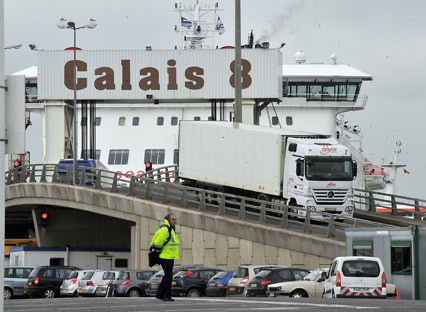UK changes rules on child refugees
Polling reveals swing in public attitudes as government closes door to child migrants

A free daily email with the biggest news stories of the day – and the best features from TheWeek.com
You are now subscribed
Your newsletter sign-up was successful
The British government has been accused of “turning its back” on vulnerable youngsters after quietly announcing that unaccompanied child refugees will no longer be given sanctuary in the UK.
Until now, ministers have been legally required to grant asylum to children arriving in the UK under the terms of an amendment made by David Cameron’s government to an EU law in 2016, amid a flood of refugees arriving in Europe from war-torn Syria.
But in a written response to a question from Labour MP Alex Sobel last week, Immigration Minister Chris Philp said that while the ���Home Office takes its responsibility for the welfare of children very seriously”, post-Brexit Britain would no longer offer a legal route into the country for these minors.
The Week
Escape your echo chamber. Get the facts behind the news, plus analysis from multiple perspectives.

Sign up for The Week's Free Newsletters
From our morning news briefing to a weekly Good News Newsletter, get the best of The Week delivered directly to your inbox.
From our morning news briefing to a weekly Good News Newsletter, get the best of The Week delivered directly to your inbox.
Campaigners are warning that vulnerable children will “instead turn to people smuggling gangs to assist them with travelling to Britain, placing them at greater risk of trafficking”, The Independent reports.
Josie Naughton, chief executive of charity Choose Love, has accused Boris Johnson’s government of using Brexit as an opportunity to “turn its back on the weakest in society”.
And Downing Street also appears to be out of step with public opinion.
Polling of more than 2,500 people by Ipsos Mori found that the proportion of Britons who want immigration to be reduced has fallen from more than two-thirds (67%) in February 2015 to just under half (49%).
A free daily email with the biggest news stories of the day – and the best features from TheWeek.com
The latest survey, conducted in November, also found that 12% would like to see an increase in immigration to the UK, compared with 7% in 2015.
The UK introduced a new points-based immigration system at the start of this month following the end of the Brexit transition period. Under the new set-up, applicants who want to move to the UK have to qualify for 70 points to get a visa.
Having a job offer from an approved employer for a skilled job earns 40 points, and being paid at least £25,600 a year will net a further 20 points. The ability to speak English earns ten points, and applicants can also gain extra points for having qualifications such as a PhD.
The government claims the new policy will lead to less immigration. However, the Migration Observatory says this outcome “is impossible to guarantee because numbers can fluctuate for reasons unrelated to policy – such as the strength of the economy in the UK or in countries of origin”.
Chas Newkey-Burden has been part of The Week Digital team for more than a decade and a journalist for 25 years, starting out on the irreverent football weekly 90 Minutes, before moving to lifestyle magazines Loaded and Attitude. He was a columnist for The Big Issue and landed a world exclusive with David Beckham that became the weekly magazine’s bestselling issue. He now writes regularly for The Guardian, The Telegraph, The Independent, Metro, FourFourTwo and the i new site. He is also the author of a number of non-fiction books.
-
 The Olympic timekeepers keeping the Games on track
The Olympic timekeepers keeping the Games on trackUnder the Radar Swiss watchmaking giant Omega has been at the finish line of every Olympic Games for nearly 100 years
-
 Will increasing tensions with Iran boil over into war?
Will increasing tensions with Iran boil over into war?Today’s Big Question President Donald Trump has recently been threatening the country
-
 Corruption: The spy sheikh and the president
Corruption: The spy sheikh and the presidentFeature Trump is at the center of another scandal
-
 ICE eyes new targets post-Minnesota retreat
ICE eyes new targets post-Minnesota retreatIn the Spotlight Several cities are reportedly on ICE’s list for immigration crackdowns
-
 How corrupt is the UK?
How corrupt is the UK?The Explainer Decline in standards ‘risks becoming a defining feature of our political culture’ as Britain falls to lowest ever score on global index
-
 How did ‘wine moms’ become the face of anti-ICE protests?
How did ‘wine moms’ become the face of anti-ICE protests?Today’s Big Question Women lead the resistance to Trump’s deportations
-
 The UK expands its Hong Kong visa scheme
The UK expands its Hong Kong visa schemeThe Explainer Around 26,000 additional arrivals expected in the UK as government widens eligibility in response to crackdown on rights in former colony
-
 How are Democrats trying to reform ICE?
How are Democrats trying to reform ICE?Today’s Big Question Democratic leadership has put forth several demands for the agency
-
 Minnesota’s legal system buckles under Trump’s ICE surge
Minnesota’s legal system buckles under Trump’s ICE surgeIN THE SPOTLIGHT Mass arrests and chaotic administration have pushed Twin Cities courts to the brink as lawyers and judges alike struggle to keep pace with ICE’s activity
-
 700 ICE agents exit Twin Cities amid legal chaos
700 ICE agents exit Twin Cities amid legal chaosSpeed Read More than 2,000 agents remain in the region
-
 House ends brief shutdown, tees up ICE showdown
House ends brief shutdown, tees up ICE showdownSpeed Read Numerous Democrats joined most Republicans in voting yes